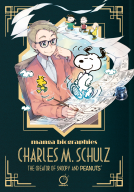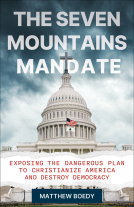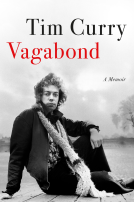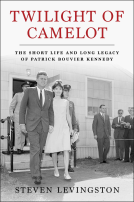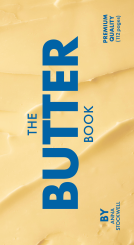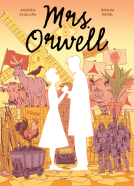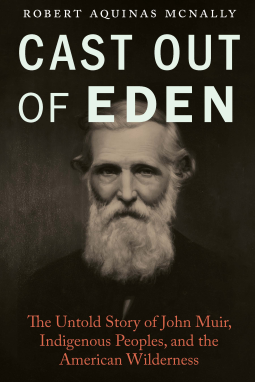
Cast Out of Eden
The Untold Story of John Muir, Indigenous Peoples, and the American Wilderness
by Robert Aquinas McNally
This title was previously available on NetGalley and is now archived.
Send NetGalley books directly to your Kindle or Kindle app
1
To read on a Kindle or Kindle app, please add kindle@netgalley.com as an approved email address to receive files in your Amazon account. Click here for step-by-step instructions.
2
Also find your Kindle email address within your Amazon account, and enter it here.
Pub Date May 01 2024 | Archive Date Apr 30 2024
University of Nebraska Press | Bison Books
Talking about this book? Use #CastOutofEden #NetGalley. More hashtag tips!
Description
Cast Out of Eden tells this neglected part of Muir’s story—from Lowland Scotland and the Wisconsin frontier to the Sierra Nevada’s granite heights and Alaska’s glacial fjords—and his take on the tribal nations he encountered and embrace of an ethos that forced those tribes from their homelands. Although Muir questioned and worked against Euro-Americans’ distrust of wild spaces and deep-seated desire to tame and exploit them, his view excluded Native Americans as fallen peoples who stained the wilderness’s pristine sanctity. Fortunately, in a transformation that a resurrected and updated Muir might approve, this long-standing injustice is beginning to be undone, as Indigenous nations and the federal government work together to ensure that quintessentially American lands from Bears Ears to Yosemite serve all Americans equally.
Advance Praise
“To most Americans, John Muir is a folk hero, a writer and thinker who inspired the nation’s wilderness preservation movement. Robert McNally’s powerful new biography offers a darker vision, situating Muir’s life and work within America’s violent campaigns of Indigenous land dispossession and genocide. Cast Out of Eden is a vivid and absorbing read, one that will challenge everything you think you know about one of America’s most famous environmentalists.”—Megan Kate Nelson, author of The Three-Cornered War, finalist for the Pulitzer Prize in History
“Robert Aquinas McNally takes John Muir off his pedestal and paints him as a man of his times, blinded by his belief in white supremacy and his faith in manifest destiny. In doing so, McNally provides a helpful, needed context for our own era and its conflicts.”—Margaret Verble (Cherokee Nation), author of Maud’s Line, finalist for the Pulitzer Prize in Fiction
“Robert Aquinas McNally lays out not only John Muir’s public love affair with the wild spaces that became national parks but also his deep-seated disdain for the American Indians whose homelands those parks expropriated. A page-turning, eye-opening read that delves unflinchingly into the dark side of preservation politics, then turns toward a future where wild spaces work their natural magic for all—not just some—Americans, including the tribes.”—Susan Devan Harness (Confederated Salish and Kootenai Tribes), author of the award-winning Bitterroot: A Salish Memoir of Transracial Adoption
“Robert Aquinas McNally brings John Muir and his world to life, warts and all, with an eye for gripping historical details. An urgent story for our troubled times, this is narrative nonfiction at its best!”—Boyd Cothran, author of The Edwin Fox: How an Ordinary Sailing Ship Connected the World in the Age of Globalization, 1850–1914
“A thought-provoking masterpiece. Following the life and achievements of John Muir, ‘Father of the National Parks,’ McNally masterfully shows how one of America’s greatest achievements—the preservation of our wildest places—is indelibly tied to one of our most abject failures—the treatment of the Native Americans who lived there.”—Matthew Kerns, Spur and Western Heritage Award–winning author of Texas Jack: America’s First Cowboy Star
“Robert McNally has added to John Muir’s legacy in a way that will hook both conservationists and those with little interest in wilderness. At a time when the natural world has once again become the protagonist of our story, McNally breaks down the complicated and conflicted relationship with nature to show how our long-standing attitudes toward wild spaces grew from the limited perspective of an elite few. This is the story not of a single man but of a time, place, and culture that created a public figure who has hugely influenced how we interact today with the natural world—for good and ill.”—Katya Cengel, author of From Chernobyl with Love
“Robert Aquinas McNally throws back the curtain on John Muir and our deeply held beliefs about how the American wilderness came to be. A dogged researcher, McNally offers sometimes unsettling facts but steeps such accounts in a deep reverence for storytelling. As hard-hitting as it is lyrical, the profound truth at the heart of this book invites all of us to rethink what we’ve been told about Indigenous peoples.”—Melissa Fraterrigo, author of Glory Days
“The unique value of this groundbreaking study is its unflinching demonstration that John Muir’s racial views were not peripheral—they were central to his whole conception of wilderness. Native Americans had ‘no right place in the landscape,’ Muir believed, if wilderness was to achieve its higher purpose as a space for white supplanters to contemplate its spiritual essence. Cast Out of Eden is a seminal work, written with remarkable sensitivity and compassion.”—James J. Rawls, author of Indians of California: The Changing Image
“Cast Out of Eden is a necessary read for everyone interested in John Muir. Like Muir himself in his quest to understand nature, McNally has gone deep to explore the man’s writings within the turn-of-the-twentieth-century American zeitgeist. The result is the compelling story of a complicated figure and his place in shaping this country’s vision of itself.”—Mike Wurtz, head of the Holt-Atherton Special Collections and Archives, including the John Muir Papers, at the University of the Pacific
“A colorful portrait of the driven, politically savvy, and often ecstatic John Muir, and simultaneously a condemnation of his unwillingness or inability to transcend the racism of his era. . . . . Robert Aquinas McNally shines a light on the attitudes that resulted in the failure not only of Muir but also of U.S. presidents, universities, the National Park Service, railroad tycoons, the Sierra Club, and others to acknowledge successful Native American stewardship of the landscape. The final chapter lays out contemporary efforts by government and Native peoples to overcome this history, part of the soul-searching, renaming, and re-envisioning today’s world needs.”—Malcolm Margolin, co-founder of News from Native California, former director of Heyday Books, and author of The Ohlone Way
Available Editions
| EDITION | Other Format |
| ISBN | 9781496227263 |
| PRICE | $34.95 (USD) |
| PAGES | 328 |
Links
Available on NetGalley
Average rating from 3 members
Featured Reviews
<i>Cast Out of Eden</i> is a biography of John Muir. If you are unfamiliar with Muir, he invented the outdoors in 1890. Put a pin in that joke, but the point is that he is well-enough established a historical figure that I do not feel the need to elaborate much here.
I predict that the reviews of this book will look like a snapshot of the culture war, with words like 'problematic' and 'woke mob' getting tossed about. I am a little more in the middle as regards this book. I know, I know, everyone claims that, but in essence I think that the author's thesis is both correct and relevant, but that the own goals in the text hurt the immediacy of the message.
The twist here is that Muir is beloved on both sides of the political spectrum. On the left he is seen as a landmark environmentalist. On the right, Muir is a small-e evangelical and the copywriter of American Muscular Christianity (while he would not identify himself with either).
But he sure wrote a lot of racist things. It is one thing to read <a href="https://www.goodreads.com/quotes/tag/john-muir"> Nothing truly wild is unclean</a>," (with 104 likes on this website as of the writing of this) and realize that the sentence preceding it is "The worst thing about [the American Indian] is their uncleanliness." This is not complaining about the past. It is part of his philosophy of the wilderness and the importance of the outdoors, as he viewed a white man's burden that attached to the proper stewardship of wild places, and that Anglo-Saxon Protestants were the only people with sufficient reservation to be conservationists. Which they were God-sent to do, for the benefit of all the people's of the world.
The sort of racism he displays tends to be altogether predictable in its sentiment, though as noted above his fixation on cleanliness as relates to the American Indian feels idiosyncratic and mysophobic. It is tempting to take this and play amateur Freudian and try and come up with an explanation based on Muir's biography, but if I did, I would be engaging in one of the persisting weaknesses of the book, and when it gets too hit piece. There are a lot of negative inferences. All are supportable, but few are warranted. For instance, at one point the author refers to Muir's nickname among some of the Alaskan natives as a joke, rather than an honor This is not baseless, but neither is it clear. (And I do find it interesting that the cites on it include the culture critic's column [as a culture critic, I warn you never to trust culture critics] but not the <a href="https://www.adn.com/alaska-life/2016/12/30/an-expert-opinion-on-whether-john-muir-was-really-an-honorary-tlingit-chief/">response</a> by the linguist of the tribe, whose take was equivocal.) The author sells on the worst possible choices.
At points, this winds up obfuscating the more interesting stores of Muir. In the above story, Muir is much more accepting and laudatory of the Alaskan Natives than he is of other indigenous groups. Similarly, Muir's views on the ownership of cultural property seem to vary, sometimes upset by stealing or destroying of items like grave goods, and sometimes destroying them himself with willful abandon. He has friendships, particularly with eugenicists (a lot of eugenicists. So many, many eugenicists) but his own writing does not seem to reflect that, and might even contradict it. Why were some big shot tourists okay and not others whom he befriended? How does someone who was engineering tyro end up the United State's premier environmentalist?
Muir is human, and not bound to consistency in his behaviors, so it may be that such questions are unanswerable. Even if they are, this biography, with its particular inflection, may not be the right place to answer them. But in that it feels like they are often answered in a way as to structure a sort of smear to Muir's character, which feels like bad faith.
Functionally, I think that this is okay. Muir has much more hagiography by volume. But I worry that it creates an unnecessary distraction from the important thesis of the book.
We return to the pin. It is a joke to say that Muir invented the outdoors, as if the outdoors was something he started in his garage and now is listed on the NASDAQ. It is not a joke to say that Muir invented the idea of the outdoors, that Muir impressed a concept upon the space of America that we now accept as the outdoors, and that concept is so foundational to how we think about space in the nation that it is impossible to see.
Muir's view was dualist: there is a sacred wild that reflects the mind of God and a profane civil that reflects the degeneracy of man. But the author is here to show how Muir's wild was nothing of the sort. Humans had been living in the Americas for millennia. The landscape was not natural, but built to their particular lifestyle. Pretending it was natural was an element of settler colonialism that allowed, well, settler colonialism at all, because it treats the whole of the land as fundamentally wild and unclaimed as opposed to all claimed in a network of national identity that is unrecognized and disrespected.
And here, the author is on point to establish that Muir was a knowing participant in this sort of steps to genocide. This is unlike his acceptance of a more ambient racism, and the author points out advocates like C.E. Kelsey who, while still racist in the abstract, recognized the way that enforcing wild spaces meant denying the property rights of American Indians, and wanted a blended approach. I am a little unsure that it is truly better, it's a little too Hobbs vs. Rousseau. But the idea that Muir took things in the wrong way once you get past the pretty words is indelible because of his own words on the topic and his treatment of American Indians as a sort of inconvenient fact.
I think that acknowledging this is very important for policy debates today, with ramifications about how we think about cities and land and personal determination. And like Muir's bicameral appeal, it presents an equally unifying negative one, disabusing the world of both the I got mine Libertarian and the haughty central planner. And it is unique to see how we can point to one thing and say this is the origin story, here is where the myth is not just generally asserted but codified. The idea that we can isolate and speak truth about such things is important for all manner of addressing what can be changed in political life. I just hope that the need to take all the easy buckets does not cause readers to miss that.
My thanks to the author, Robert Aquinas McNally, and to the publisher, University of Nebraska Press, for making the ARC available to me.
This book is amazing!! It’s the untold story of John Muir. He’s the father of our national parks. As an avid hiker I enjoyed this book.
 Reviewer 511457
Reviewer 511457
Many thanks to NetGalley and the University of Nebraska Press for the digital ARC of this book. I am leaving this review voluntarily.
I've read several biographies about John Muir and have seen Ken Burns National Park documentary series more times than I can count. Most of the depictions of Muir have been of a wise sage who realized before most people the need to protect the lands of the American west from being overrun. But who was the protection for? The well-to-do Eastern Protestants who came out to vacation in "untamed land"? As with most biographies written more than a decade ago, very little attention is given to the indigenous people who lived on the very land that the United States government protected by creating national parks. This book seeks to rectify that fact.
There's a well-known Muir quote that goes something like this "Nothing truly wild is unclean." However, when you read the whole quote, it's racist AF. The sentence preceding that famous quote is "The worst thing about the American Indian is their uncleanliness." And that's just one of the fun quotes the author unearthed. That said, however much one wants to condemn Muir for his beliefs, in the context of the times, it was not an unusual thought for a white, educated, Anglo-Saxon Protestant.
It's important to note that this book isn't just a deep dive into John Muir and his dismissal of any non-white person he came across. Rather, it's a look at the times in which Muir lived, the other important decision-makers when it came to the national park system and transcontinental railroad. The book points out repeatedly that when Muir or others encountered Chinese workers of Indigenous people, they are merely mentioned in passing. It is rare that an actual name is used in Muir's writings unless it's a white person.
I do think that at times the point of the book is stretched a little bit, as after Muir's death the book continues on to mark other notable screwing-over of Indigenous People up until the present-day. However, I do think on the whole, this book is a great start in a more nuanced look at Muir and others like him, and how they shouldn't be held so high up on the pedestal.
For more reviews, visit www.bargain-sleuth.com
Readers who liked this book also liked:
Yuzuru Kuki
Biographies & Memoirs, Children's Nonfiction, Comics, Graphic Novels, Manga
Stephanie Stalvey
Biographies & Memoirs, Christian, Comics, Graphic Novels, Manga
Mariam Naiem
Comics, Graphic Novels, Manga, History, Politics & Current Affairs
Rebecca Donnelly
Children's Nonfiction, Comics, Graphic Novels, Manga, Science

